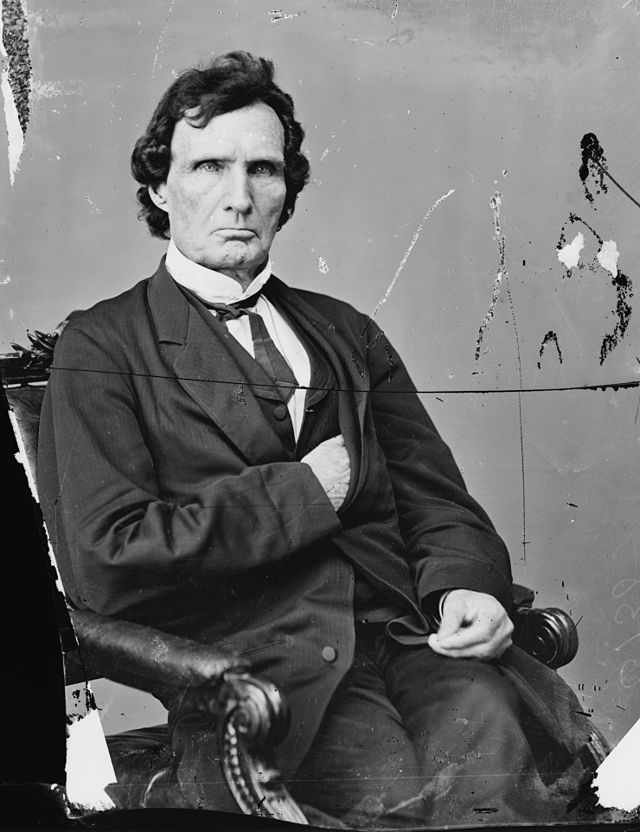The Legacy of Abolitionist Thaddeus Stevens
Thaddeus Stevens, a Radical Republican born on this day in 1792, was a prominent abolitionist and Congressman. Here's a look at his legacy.

Ibram X. Kendi
Partner • #GirlDad • Scholar @BU_Tweets • Dir @AntiracismCtr • @NationalBook Award Winner • #1 NYT Bestselling Author • MacArthur Fellow • Surviving Cancer 🐍

-
When politicians keep kids from learning about slavery out of a fear of making White students feel "guilty," they prevent kids from being inspired by White abolitionists like Congressman Thaddeus Stevens, the most radical of the “Radical Republicans,” born #OTD in 1792. A 🧵1/ pic.twitter.com/gLstBYGNOm
— Ibram X. Kendi (@DrIbram) April 4, 2023 -
A Vermont native, Stevens was born with a clubfoot that gave him a lifelong limp. He experienced ableism, which eventually helped him to recognize other forms of injustice. After graduating from Dartmouth in 1814, Stevens relocated to Gettysburg, PA, and practiced law. 2/ pic.twitter.com/MlIXCBgXKQ
— Ibram X. Kendi (@DrIbram) April 4, 2023 -
In 1821, Stevens represented an enslaver against runaway Charity Butler. Stevens won. The young lawyer came to regret his role in sending Butler back into slavery. But he didn’t wallow in his guilt. He embarked on becoming an abolitionist, defending runaways for free. 3/ pic.twitter.com/NepwFTUXBy
— Ibram X. Kendi (@DrIbram) April 4, 2023 -
In 1833, Stevens became a PA legislator. He defended an 1834 law expanding PA's public schools “to the poorest child of the poorest inhabitant.” At the 1837 PA constitutional convention, he was the only delegate to oppose a provision barring free Black people from voting. 4/ pic.twitter.com/xk4t69wKWA
— Ibram X. Kendi (@DrIbram) April 4, 2023 -
In 1848, after moving to Lancaster, Stevens was elected to Congress. The diabolical Fugitive Slave Act of 1850 enraged Stevens. It required northerners to cooperate in capturing runaways. Stevens pledged to "strive by every lawful means to abolish slavery throughout the land." 5/ pic.twitter.com/t1jtnmufnP
— Ibram X. Kendi (@DrIbram) April 4, 2023 -
In July 1861, Stevens was one of only two Congressmen to vote against the Crittenden-Johnson Resolution. Democrats and Lincoln Republicans resolved to reassure border state enslavers and pro-slavery Northerners that the Civil War was about restoring the Union, not abolition. 6/ pic.twitter.com/72L9ytCjNT
— Ibram X. Kendi (@DrIbram) April 4, 2023 -
Stevens helped impeach Pres. Johnson & offered a Reconstruction plan that would've given Confederate-owned land to freed people & sold the rest to pay the war debt. While that was unsuccessful, he supported the Southern Homestead Act of 1866, which gave some land to freedmen. 7/ pic.twitter.com/gAWd8URNKo
— Ibram X. Kendi (@DrIbram) April 4, 2023 -
Stevens said, "there can be no fanatics in the cause of genuine liberty." He strove to better “the condition of the poor, the lowly, the downtrodden of every race and language and color,” even as his health declined and had to be carried into the House. He died at 76 in 1868. 8/ pic.twitter.com/KKNOudwOta
— Ibram X. Kendi (@DrIbram) April 4, 2023 -
Stevens chose an interracial cemetery in Lancaster. As he had inscribed on his tombstone, he aimed to “illustrate in [his] death” the principle he “advocated through a long life,” namely, “equality of man before his Creator.” A principle, a life every child should learn. 9/9 pic.twitter.com/6UMJbGKdfK
— Ibram X. Kendi (@DrIbram) April 4, 2023
